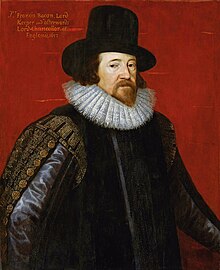an English philosopher and statesman. His works are seen as contributing to the scientific method and remained influential through the later stages of the scientific revolution.
For much more information, also see
Born
Francis Bacon 22 January 1561 The Strand, London, England
Died
9 April 1626 (aged 65) Highgate, Middlesex, England
Spouse(s)
Alice Barnham ( m. 1604)
adultbasic
Britain
Education
Trinity College, Cambridge (no degree) Gray's Inn ( call to bar, 1582)
era
1600-1800
Era
Renaissance philosophy 17th-century philosophy
Main interests
Natural philosophy Philosophical logic
Monarch
James I
Notable ideas
List Baconian method Idola fori Idola theatri Idola specus Idola tribus Knowledge is power Salomon's House
Notable work
Novum Organum
Other names
Lord Verulam
Parents
Sir Nicholas Bacon (father) Lady Anne Bacon (mother)
Preceded by
Sir Henry Hobart
Region
Western philosophy
Resting place
St. Michael's Church, St. Albans
School
Empiricism
Succeeded by
Sir Henry Yelverton

